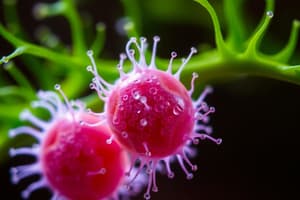Podcast
Questions and Answers
What is one primary reason living systems require energy?
What is one primary reason living systems require energy?
- To decrease biological complexity
- To maintain stable ecosystems
- To recycle matter effectively
- To facilitate movement and growth (correct)
How does studying biology help in addressing global challenges?
How does studying biology help in addressing global challenges?
- By explaining human behavior in ecosystems
- By eliminating the need for conservation efforts
- By promoting technological advancements only
- By providing insights into biological processes affecting climate and health (correct)
Why is biology important for advancements in medicine?
Why is biology important for advancements in medicine?
- It helps in legal matters concerning health policies
- It solely focuses on historical medical practices
- It aids in drug development and understanding diseases (correct)
- It encourages non-scientific approaches to health
What role does knowledge of biodiversity play in conservation efforts?
What role does knowledge of biodiversity play in conservation efforts?
In what ways do innovation and technology depend on biology?
In what ways do innovation and technology depend on biology?
Which branch of biology focuses on studying heredity and variation in inherited characteristics?
Which branch of biology focuses on studying heredity and variation in inherited characteristics?
What does the term 'cell theory' state regarding living organisms?
What does the term 'cell theory' state regarding living organisms?
Which of the following concepts explains how organisms with favorable traits are more likely to survive and reproduce?
Which of the following concepts explains how organisms with favorable traits are more likely to survive and reproduce?
What is the primary focus of the branch of physiology in biology?
What is the primary focus of the branch of physiology in biology?
Which biological principle describes the concept that all organisms are interconnected, and a change in one part affects another?
Which biological principle describes the concept that all organisms are interconnected, and a change in one part affects another?
In what way does molecular biology differ from cell biology?
In what way does molecular biology differ from cell biology?
Which of the following is NOT a key concept in biology?
Which of the following is NOT a key concept in biology?
What does metabolism encompass in biological terms?
What does metabolism encompass in biological terms?
Flashcards
Biology Definition
Biology Definition
The scientific study of life and living organisms.
Cell Theory
Cell Theory
All living things are made of cells; cells come from pre-existing cells.
Natural Selection
Natural Selection
Organisms better suited for their environment survive and reproduce more.
Homeostasis
Homeostasis
Signup and view all the flashcards
Metabolism
Metabolism
Signup and view all the flashcards
DNA function
DNA function
Signup and view all the flashcards
Scientific Method
Scientific Method
Signup and view all the flashcards
Classification
Classification
Signup and view all the flashcards
Energy Flow in Living Things
Energy Flow in Living Things
Signup and view all the flashcards
Matter Cycling in Ecosystems
Matter Cycling in Ecosystems
Signup and view all the flashcards
Importance of Biology in Global Challenges
Importance of Biology in Global Challenges
Signup and view all the flashcards
Biology's Role in Medicine
Biology's Role in Medicine
Signup and view all the flashcards
Biology's Role in Conservation
Biology's Role in Conservation
Signup and view all the flashcards
Study Notes
Introduction to Biology
- Biology is the scientific study of life and living organisms.
- It encompasses a vast array of topics, including the structure, function, growth, origin, evolution, and distribution of living things.
- Biological study delves into the molecular interactions within cells, the complex systems of organisms, and the interactions between organisms and their environment.
Branches of Biology
- Cell Biology: Focuses on the structure and function of cells.
- Genetics: Studies heredity and the variation of inherited characteristics.
- Molecular Biology: Explores the structure and function of biological macromolecules like proteins, DNA, and RNA.
- Ecology: Investigates the interactions between organisms and their environment, including populations, communities, and ecosystems.
- Evolutionary Biology: Examines the processes that have shaped the diversity of life over millions of years.
- Physiology: Studies the functions of different parts of an organism.
- Anatomy: Investigates the structural organization of organisms.
- Botany: The study of plants.
- Zoology: The study of animals.
Key Concepts in Biology
- Cell Theory: The fundamental concept that all living organisms are composed of cells, and cells are the basic units of life. Cells arise only from pre-existing cells.
- Evolution by Natural Selection: The driving force behind the diversity of life, where organisms with traits better suited to their environment are more likely to survive and reproduce, passing those traits to their offspring.
- Homeostasis: The ability of an organism to maintain a stable internal environment despite external fluctuations.
- Metabolism: The sum of all chemical reactions that occur in an organism, including both catabolic (breaking down) and anabolic (building up) processes.
- DNA: Deoxyribonucleic acid, the molecule that carries genetic information.
- RNA: Ribonucleic acid, a molecule involved in protein synthesis and other cellular processes.
Biological Principles
- The Scientific Method: Systematic approach to acquiring knowledge through observation, hypothesis formation, experimentation, and analysis.
- Classification: The process of grouping organisms based on shared characteristics. Binomial nomenclature is a system used for naming organisms.
- Interconnectedness: Biological systems are intricately interconnected. Changes in one part of a system often affect other parts.
- Energy Flow: Living systems require energy to function. This energy is transferred and transformed through various biological processes.
- Matter Cycling: Matter is continuously recycled within and between ecosystems.
Importance of Studying Biology
- Understanding the Natural World: Biology provides insights into the workings and complexities of life on earth.
- Addressing Global Challenges: Problems like climate change, food security, and disease require biological understanding to find solutions.
- Advancements in Medicine: Biology is crucial to medical breakthroughs in areas such as drug development and understanding of disease.
- Conservation Efforts: Knowledge of biodiversity and ecosystems is vital for conservation and species protection.
- Innovation and Technology: Biomedical engineering, biotechnology, and other fields rely heavily on biological principles.
Studying That Suits You
Use AI to generate personalized quizzes and flashcards to suit your learning preferences.




